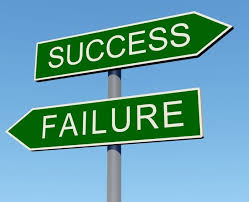
Having been involved in business for over four decades I like to think I’ve observed a lot of what works, and what doesn’t, in the ever-challenging world of commerce.
Last month we concentrated on surviving the first 18 months of business where nearly 80 per cent of all start-ups fail to make the grade; this time we will take a look at life after the crucial first 12-18 months.
Of course the bad news is that 80 per cent of the so-called ‘lucky’ 20 per cent of start-ups who survive their first 18 months in business never make it past the next big milestone, viz. the 7-year hurdle.
That means only 4 per cent (or less than one in 20) continue the on-going battle to survive in what should be recognised as one of the most challenging situations anyone is likely to face in their whole life – barring global warfare or some catastrophic personal disaster.
Think of it this way. The majority of people work in organisations where following the rules explicitly is seen as a most desirable quality. And the simpler the rules the better. But the fact is we live in a complex globalised world with ever increasing innovation and attendant risk. As a manager or business owner if you move too fast you get caught out, and if you don’t evolve with market conditions you die.
The KISS principle has for many years been trotted out as how corporations should operate and meet their organisational goals. Oh, if you haven’t had the pleasure, KISS stands for Keep It Simple Stupid. The KISS principle states that most systems work best if they are kept simple rather than made complex; therefore simplicity should be a key goal in design and complexity should be avoided.
As a consequence of KISS ‘smarter’ thinking in most organisations such as the act of using one’s common sense, intuition or curiosity or experience gained from working in differing environments, is often not appreciated at all and actively frowned upon.
After years of working in this type of organisation the ‘average’ person comes to think that anyone perceived to be bucking the system and/or expressing their individuality in any way is suspect and not to be trusted.
I guess Generation X and Ys may find this attitude strange or unusual but for a large percentage of the older population it is the way of life most have experienced their whole working life. What I’m trying to say is that focus and persistence are personal characteristics that are largely overlooked when considering what it takes to succeed in business long term. To my mind the trait, often derided as pure ‘stubborness’, is an essential component in the psychological make-up of people who usually succeed in commerce.
The ability to make personal decisions that often fly in the face of conventional wisdom and to maintain the requisite belief under a constant barrage of negativism and scepticism should, to my mind, more accurately be described as ‘moral courage’.
And if I was asked what was the most important factor (after persistence) as a gauge for predicting long term success I would have to say timing.
Since long term business success is ‘long term’ by definition whether a particular business idea or model is an ultimate winner (or a turkey) is often largely dictated by timing.
Twenty or thirty years ago newspapers were described as veritable rivers of gold, well the ‘classies’ anyway. Fast forward to today and the only speculation you hear about this venerable industry is whether they will survive another 5-10 years.
For decades newspapers were seen as the bluest of blue-chips in terms of share ownership. In the past 5 years a supposedly safe investment in some of the leading Australian newspapers would now only be worth about 10% of its original purchase price.
What I’m saying is, even the most successful of business models has a finite life-cycle. James Packer seems to have timing. When he sold Channel 9 all the so-called smarties in the various media and the investment types thought he was misguided. And when he then sank all the funds into casinos they were certain he was on the wrong track. Say no more.
Finally, a defining characteristic of successful organisations I have worked with over the years is their ability and willingness to tolerate failure; whether that involves a new product launch or a re-vamped process for doing traditional work. Failure should be recognised by management as the result of trying new methods, i.e. innovation, and applauded NOT as a sign that the rules were not being followed and penalties imposed. Of course. there is no excuse for repeating the same mistake … that’s just being dumb.
Finally, as our current PM says: “In the 21st century we all have to learn to work a lot smarter”. And I can’t argue with that … but actually doing it also takes good timing and a large dollop of persistence.
Next issue: Do business owners and entrepreneurs ever retire?
CONTRIBUTOR – Drew Martin: Historical construction equipment is the on-going fascination of this Wollongong-based and now retired earthmover. And it was this strange obsession, together with senior links with the industry and the characters within it, that were the catalyst for his professional writing career and the original reason for adopting a pen name. After appearing each month for nearly a decade with his popular and always controversial Ripping Yarns column in the trade magazine The Earthmover & Civil Contractor Drew next tried his hand at children’s books with his REX-3 The Robot Excavator series being published well before Bob the Builder first appeared on bookshelves. In recent years DM has largely turned his attention online and continues to amuse a younger audience with his original way of looking at what most other people consider completely normal life.
Comments
Powered by Facebook Comments